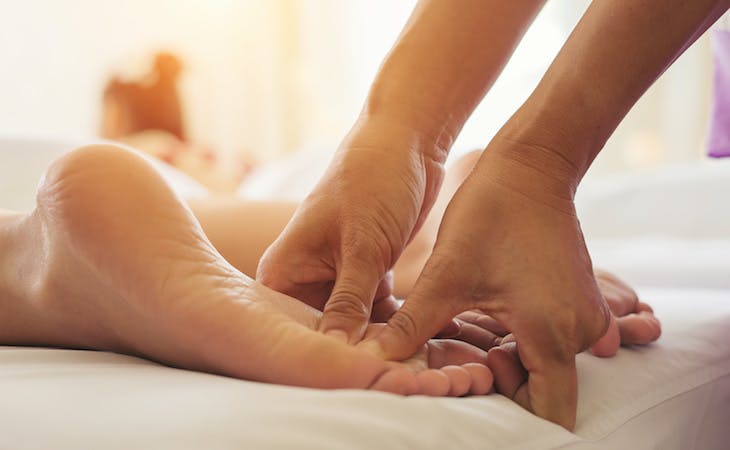Although there are plenty of over-the-counter sleep aids and prescription sleep medications available these days, more and more people are turning to natural alternatives to treat insomnia that won’t cause morning grogginess or other side effects.
Some of these alternative approaches include using essential oils, doing yoga, taking specific supplements, or getting acupuncture, but here’s one you may not have considered: reflexology. Read on for an introduction to this practice and find out how it can directly benefit sleep quality.
What is reflexology?
Reflexology is “a form of bodywork therapy using touch to manipulate the nerve endings or reflex points in the feet, hands, and ears that correspond with organs, glands, and various parts of the body,” says Gregory Quandt, licensed massage therapist and owner of Body Archeology, in Madison, Wisc., where he provides reflexology services.
Reflexology originated in China thousands of years ago. Quandt explains that the belief behind reflexology is that reflex point stimulation, as it’s called, will help bring balance to each corresponding organ or body part, something that can release stagnant energies and promote cell oxygenation, which helps release metabolic waste from the cells.
“A reflexology treatment is extremely relaxing,” Quandt says. “Whether you receive a session lying down on a massage table or in a reclining chair, you will most likely experience deep relaxation.”
He adds that many of his clients have reported feelings of “energetic tingling” or “warmth in their bodies,” noting that “anytime someone receives touch, there is the chance that they could release old tension and trauma or tap into an old memory or emotion, which can be very freeing.” (Find out whether cupping can improve your sleep.)
What are the sleep benefits of reflexology?
There has been some research on the connection between reflexology and sleep. One such study from 2011 says although more research needs to be done, foot reflexology “is a useful nursing intervention to relieve fatigue and to promote sleep.”
There’s one main reason why reflexology might positively impact sleep: Research has confirmed that reflexology switches on the parasympathetic nervous system, or the part of your nervous system that’s in charge of rest, digestion, and decreasing heart rate. Studies have shown that in general, reflexology has the power to decrease stress, anxiety, and arousal.
Quandt has seen these sleep-related foot reflexology benefits firsthand. “Reflexology may help people find better sleep thanks to the relaxing nature of the work,” he says. “Like with massage, meditation, yoga, and sound healing, a session of reflexology will activate the parasympathetic nervous system, helping reduce anxiety and giving the receiver a sense of wellbeing and calm—all great ingredients for better sleep.”
Keep in mind that some people experience a heightened sense of energy after receiving a reflexology treatment. Quandt says that’s because “everyone is not built the same, and what chills one person out may jazz the next person up.”
If you find yourself feeling overly energetic after going to an appointment or giving yourself a reflexology treatment at home, Quandt recommends that before bed, you rinse your ankles and feet or wrists and hands under cold water.
“This is a simple trick I learned when I was suffering from insomnia, and it helped calm my nervous system and put me in a restful state,” he says. (Learn about the sleep and health benefits of qigong.)
How do you practice reflexology at home?
If you’re unable to make an appointment with a reflexology therapist—perhaps you don’t have one near you or you don’t have the time or money available for treatments—Quandt says that “tending to yourself is very effective.”
To start, find a reflexology foot map online to help guide you through self-treatment, he suggests. (We’ve included one above for reference.) “You don’t need a lot of pressure to get results,” says Quandt. “Stay present to what you are experiencing and remember breath is a catalyst for change and somatic release.”
From cryotherapy to reiki, here are more trendy wellness treatments that might help you sleep better.




